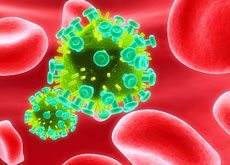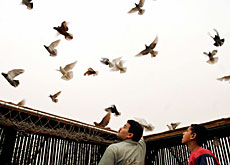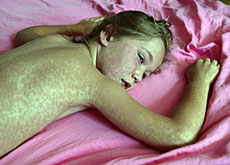Swiss face up to infectious disease threat

Infectious diseases are appearing and spreading faster than ever before, according to the World Heath Organization (WHO) annual report.
The Geneva-based organisation is calling for increased cooperation to combat these threats, an area in which Switzerland has long been active.
In all, 39 new diseases have developed since 1967, including HIV, Ebola and Sars, said the WHO in its report entitled “A safer future: global public safety in the 21st century”. A major factor in their spread is the ease in which borders can be crossed.
Centuries-old threats such as influenza, malaria and tuberculosis are also still present due to virus mutation, increasing resistance to medicines and weak health systems, added the WHO.
In Switzerland, top health officials are well aware of the situation.
“Twenty years ago infectious diseases weren’t perceived as a big danger,” Gaudenz Silberschmidt, head of international affairs at the Swiss Federal Health Office, told swissinfo.
“Today they are a threat and a challenge for all countries, including Switzerland.”
New risks to health include epidemics – 1,100 of them have been identified by the WHO, including bird flu and polio – as well as unknown diseases, which may arise from acute environmental or climatic changes and from industrial pollution and accidents.
The WHO says these threats may put millions of people at risk in several countries.
What can be done
The report has therefore drawn up six key recommendations to help secure public health safety, including the revised International Health Regulations, which have been in force since June this year.
Silberschmidt says that the agreement, applicable in the WHO’s 193 member countries, should bolster global health protection and help countries deal with new threats.
The regulations define how countries should assess and report public health emergencies of international concern.
They also set out how to deal with these matters. “The WHO calls together an emergency committee and the WHO’s head is in charge of drawing up measures and recommendations which are then transmitted to countries,” said Silberschmidt.
The rules are often hard to put into practice in developing countries, but there are ways of offering support.
“Within the WHO framework Switzerland has proposed making an international stockpile of vaccines for poorer countries,” explained Silberschmidt.
“We are also very active in the Commission on Intellectual Property Rights, Innovation and Public Health and in putting its proposals into practice,” he added.
This commission is presided over by Ruth Dreifuss, a former Swiss interior minister whose portfolio included health.
Swiss adjustments
But even developed countries like Switzerland have to make adjustments to conform to WHO regulations, which is why the law on epidemics is currently being revised.
“The new law should notably allow for the clear definition of the ways in which the government and cantons should work together, in other words, to define who should do what in case of a major crisis,” said Silberschmidt.
The government is also intending to negotiate an accord with the European Union on health, said the official. “The minister in charge of health will proposal a mandate for negotiation to the government at the end of the year,” said the official.
This would allow Switzerland to be integrated into the European Centre of Disease Prevention and Control (ECDC), which is based in Stockholm, Sweden.
The centre is charged with boosting protection against infectious diseases across Europe.
swissinfo, based on a French article by Frédéric Burnand in Geneva
Full implementation of International Health Regulations by all countries.
Global cooperation in surveillance and outbreak alert and response in case of an epidemic.
Open sharing of knowledge, technologies and materials, including viruses and other laboratory samples, necessary to optimize secure global public health.
Global responsibility for strengthening the public health infrastructure of all countries.
Cross-sector collaboration within governments.

In compliance with the JTI standards
More: SWI swissinfo.ch certified by the Journalism Trust Initiative




You can find an overview of ongoing debates with our journalists here. Please join us!
If you want to start a conversation about a topic raised in this article or want to report factual errors, email us at english@swissinfo.ch.